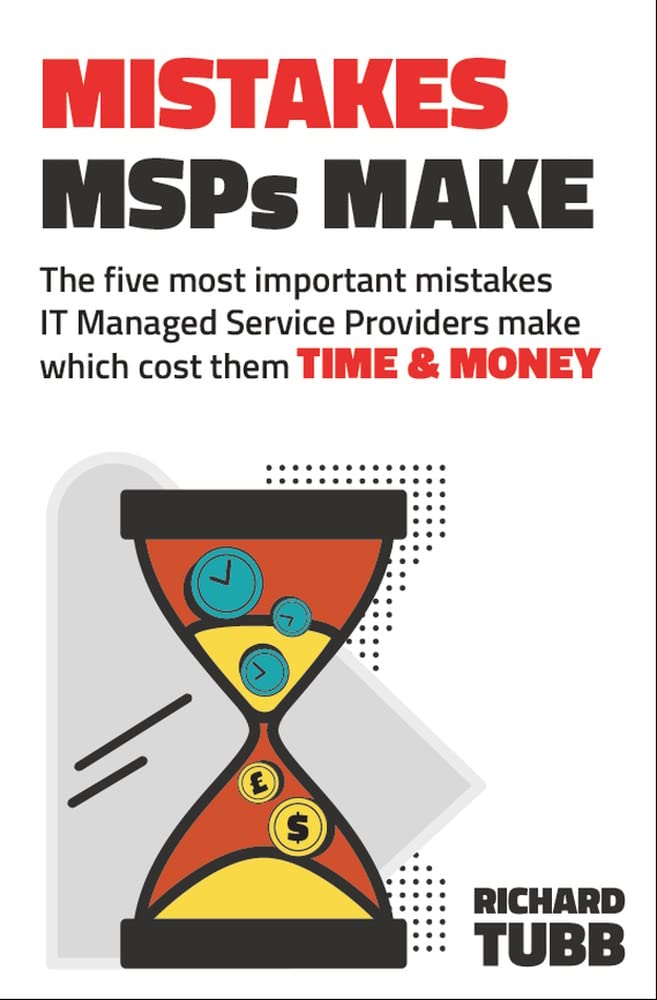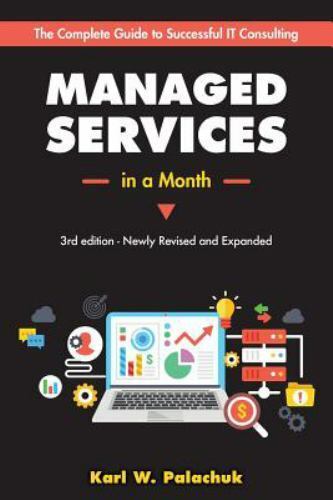Your cart is currently empty!
Tag: Managed

The Future of IT Management: The Rise of Managed Service Providers
In today’s fast-paced and ever-changing business landscape, the role of IT management is becoming increasingly vital for organizations of all sizes. With the constant evolution of technology and the growing complexity of IT systems, many companies are turning to managed service providers (MSPs) to handle their IT needs.Managed service providers are third-party companies that provide a range of IT services and support to businesses on a subscription basis. These services can include everything from network monitoring and security to data backup and disaster recovery. By outsourcing their IT management to an MSP, organizations can free up their internal IT teams to focus on more strategic initiatives, while also gaining access to specialized expertise and cutting-edge technologies.
One of the key reasons why more and more companies are turning to MSPs is the growing complexity of IT systems. With the proliferation of cloud computing, mobile devices, and Internet of Things (IoT) devices, managing IT infrastructure has become a daunting task for many organizations. MSPs have the expertise and resources to navigate these complexities and ensure that systems are running smoothly and securely.
Another factor driving the rise of MSPs is the increasing focus on cybersecurity. With cyber threats becoming more sophisticated and prevalent, organizations need to be proactive in protecting their data and systems. MSPs can provide round-the-clock monitoring and threat detection, as well as help companies develop and implement cybersecurity strategies to mitigate risks.
Additionally, MSPs can help businesses reduce IT costs and improve operational efficiency. By outsourcing IT management, companies can avoid the significant upfront costs of purchasing and maintaining hardware and software, as well as the ongoing expenses of hiring and training IT staff. MSPs can also provide scalable solutions that can adapt to the changing needs of a business, allowing companies to pay for only the services they need.
Looking ahead, the future of IT management is likely to be increasingly dominated by managed service providers. As technology continues to evolve and become more complex, organizations will need the specialized expertise and resources that MSPs can provide. By partnering with an MSP, companies can ensure that their IT systems are secure, efficient, and able to support their business goals in the digital age.

Understanding the Role of Managed Services in Cybersecurity
In today’s digital age, cybersecurity has become a top priority for businesses of all sizes. With cyber threats becoming more sophisticated and prevalent, companies are turning to managed services providers to help protect their sensitive data and systems.Managed services in cybersecurity involve outsourcing the management and monitoring of a company’s security infrastructure to a third-party provider. These providers offer a range of services, from threat detection and response to vulnerability assessments and compliance management.
One of the key benefits of using managed services in cybersecurity is the expertise and resources that these providers bring to the table. Many businesses do not have the in-house skills or resources to effectively manage their cybersecurity needs, making it difficult to stay ahead of evolving threats. Managed services providers have specialized teams of security experts who are constantly monitoring for threats and vulnerabilities, ensuring that businesses are protected at all times.
Additionally, managed services in cybersecurity can help businesses save time and money. By outsourcing their security needs, companies can avoid the costs associated with hiring and training internal security staff, as well as investing in expensive security tools and technologies. Managed services providers typically offer flexible pricing plans that can be tailored to fit a company’s budget and needs, making it a cost-effective solution for businesses of all sizes.
Another important aspect of managed services in cybersecurity is the proactive approach to security that these providers offer. Rather than waiting for a security breach to occur, managed services providers work to prevent threats before they happen. This includes conducting regular security assessments, implementing security best practices, and staying up-to-date on the latest cybersecurity trends and technologies.
Overall, understanding the role of managed services in cybersecurity is crucial for businesses looking to protect their sensitive data and systems. By outsourcing their security needs to a trusted provider, companies can benefit from expert guidance, cost-effective solutions, and proactive security measures that help mitigate the risks of cyber threats. As cyber threats continue to evolve, partnering with a managed services provider can give businesses the peace of mind they need to focus on their core operations while staying secure in an increasingly digital world.

Managed Care Pharmacy Practice
Price:$180.95– $93.21
(as of Nov 23,2024 00:06:39 UTC – Details)
Publisher : Jones & Bartlett Learning; 2nd edition (December 25, 2008)
Language : English
Hardcover : 633 pages
ISBN-10 : 0763732400
ISBN-13 : 978-0763732400
Item Weight : 2.55 pounds
Dimensions : 7 x 1.5 x 9.1 inches
Managed Care Pharmacy Practice: What You Need to KnowManaged care pharmacy practice is a critical component of the healthcare system, ensuring that patients receive safe, effective, and cost-effective medication therapy. As a managed care pharmacist, you play a key role in managing medication use, promoting medication adherence, and optimizing patient outcomes.
In this post, we will dive into what managed care pharmacy practice entails, the key responsibilities of a managed care pharmacist, and how this practice area is evolving to meet the changing needs of patients and healthcare providers.
Key Responsibilities of a Managed Care Pharmacist:
1. Formulary Management: Managed care pharmacists are responsible for developing and maintaining the formulary, which is a list of medications that are covered by a specific health plan. They work closely with physicians and other healthcare providers to ensure that the formulary is evidence-based, cost-effective, and meets the needs of the patient population.
2. Prior Authorization: Managed care pharmacists review medication requests that require prior authorization to determine if they meet the criteria for coverage. They may also provide clinical guidance to healthcare providers to ensure that the most appropriate medication is prescribed.
3. Medication Therapy Management (MTM): Managed care pharmacists provide MTM services to help patients optimize their medication therapy, improve medication adherence, and prevent medication-related problems. This may include medication reviews, patient education, and monitoring for drug interactions or side effects.
4. Cost Containment: Managed care pharmacists work to contain costs by promoting the use of generic medications, negotiating drug discounts with manufacturers, and implementing medication utilization management strategies.
5. Quality Improvement: Managed care pharmacists play a key role in quality improvement initiatives, such as medication safety programs, medication reconciliation, and monitoring of medication-related outcomes.
How Managed Care Pharmacy Practice is Evolving:
Managed care pharmacy practice is evolving to meet the changing needs of patients and healthcare providers. With the increasing focus on value-based care, managed care pharmacists are playing a more prominent role in care coordination, population health management, and value-based reimbursement models.
Technology is also playing a significant role in shaping managed care pharmacy practice, with the use of electronic health records, telehealth services, and mobile health applications to improve medication management and patient outcomes.
As the healthcare landscape continues to evolve, managed care pharmacy practice will remain a critical component of the healthcare system, ensuring that patients receive safe, effective, and cost-effective medication therapy. If you are interested in a career in managed care pharmacy, consider pursuing additional training or certification in this specialized practice area to enhance your skills and expertise.
#Managed #Care #Pharmacy #Practice
How Managed Service Providers Can Help Small Businesses Compete with Larger Enterprises
Small businesses often face significant challenges when trying to compete with larger enterprises. Limited resources, budget constraints, and a lack of specialized expertise can all hinder the growth and success of smaller companies. However, managed service providers (MSPs) offer a valuable solution to help level the playing field for small businesses.MSPs are third-party companies that provide a range of IT services and support to businesses of all sizes. These services can include network monitoring, cybersecurity, data backup and recovery, cloud computing, and more. By partnering with an MSP, small businesses can access the same level of technology and expertise that larger enterprises have, without the high costs and complexity of managing it in-house.
One of the key ways that MSPs help small businesses compete with larger enterprises is by improving their operational efficiency. MSPs can automate routine IT tasks, monitor systems for potential issues, and provide proactive maintenance to prevent downtime. This allows small businesses to focus on their core operations and strategic initiatives, rather than getting bogged down in IT issues.
Additionally, MSPs can enhance the cybersecurity posture of small businesses, which is especially important in today’s digital landscape. Cyberattacks are becoming increasingly sophisticated and prevalent, and small businesses are often targeted due to their perceived vulnerability. MSPs can implement robust security measures, such as firewalls, antivirus software, and employee training, to protect small businesses from cyber threats.
Furthermore, MSPs can help small businesses take advantage of the latest technology trends, such as cloud computing and mobile solutions. By leveraging these technologies, small businesses can increase their agility, scalability, and competitiveness in the marketplace. MSPs can also provide valuable insights and guidance on how to best utilize technology to achieve business goals and objectives.
In conclusion, managed service providers offer small businesses a cost-effective and efficient way to access the IT support and expertise they need to compete with larger enterprises. By partnering with an MSP, small businesses can improve their operational efficiency, enhance their cybersecurity posture, and leverage the latest technology trends to drive growth and success. With the support of an MSP, small businesses can level the playing field and thrive in today’s competitive business environment.

Unlocking the Potential of Managed Services for Business Growth
In today’s fast-paced and competitive business environment, companies are constantly looking for ways to improve their efficiency, cut costs, and stay ahead of the competition. One strategy that has gained popularity in recent years is the use of managed services. Managed services involve outsourcing specific business functions to a third-party provider, who takes on the responsibility of managing and maintaining those functions.Managed services can encompass a wide range of services, including IT support, cybersecurity, cloud computing, data storage, and more. By outsourcing these functions to a specialized provider, businesses can free up their internal resources to focus on core business activities and strategic initiatives.
One of the key benefits of using managed services is the potential for cost savings. By outsourcing functions such as IT support and data storage, businesses can avoid the high costs associated with maintaining in-house infrastructure and hiring specialized staff. Managed service providers often operate at scale, which allows them to offer their services at a lower cost than individual companies could achieve on their own.
In addition to cost savings, managed services can also help businesses improve their operational efficiency. Managed service providers are experts in their field and can provide businesses with access to the latest technologies and best practices. This can help businesses streamline their operations, reduce downtime, and improve overall productivity.
Another benefit of using managed services is the flexibility they offer. As businesses grow and evolve, their needs may change. Managed service providers can scale their services up or down to accommodate these changing needs, making it easy for businesses to adapt to new challenges and opportunities.
By unlocking the potential of managed services, businesses can position themselves for growth and success in today’s competitive marketplace. By outsourcing non-core functions to specialized providers, businesses can focus on what they do best and leverage the expertise of others to drive innovation and efficiency. Ultimately, managed services can help businesses stay ahead of the competition, reduce costs, and achieve their strategic goals.

The Managed Hand: Race, Gender, and the Body in Beauty Service Work
Price: $9.99
(as of Nov 22,2024 17:29:22 UTC – Details)
ASIN : B007A0I9DS
Publisher : University of California Press; 1st edition (June 2, 2010)
Publication date : June 2, 2010
Language : English
File size : 2235 KB
Text-to-Speech : Enabled
Screen Reader : Supported
Enhanced typesetting : Enabled
X-Ray : Not Enabled
Word Wise : Enabled
Print length : 327 pages
In the book “The Managed Hand: Race, Gender, and the Body in Beauty Service Work,” author Miliann Kang examines the intersection of race, gender, and labor within the beauty service industry. Kang delves into the ways in which beauty service workers, particularly women of color, navigate and negotiate their identities within a system that commodifies their bodies.Through in-depth interviews and observations, Kang sheds light on the complexities of beauty service work, highlighting how beauty standards, racial hierarchies, and gendered expectations shape the experiences of workers in this industry. She explores how beauty service workers are often required to conform to certain standards of beauty, while also facing discrimination and exploitation based on their race and gender.
Kang’s book challenges readers to think critically about the ways in which beauty service work is intertwined with issues of race, gender, and power. It serves as a valuable resource for those interested in understanding the complexities of labor within the beauty industry and the ways in which marginalized workers navigate these challenges.
Overall, “The Managed Hand” offers a thought-provoking analysis of the beauty service industry and the ways in which race, gender, and the body intersect within this field of work. It is a must-read for anyone interested in issues of labor, identity, and power dynamics within the beauty industry.
#Managed #Hand #Race #Gender #Body #Beauty #Service #Work
The Role of Managed Service Providers in Digital Transformation
In today’s rapidly evolving digital landscape, businesses are constantly seeking ways to adapt and stay ahead of the competition. One of the key strategies that companies are increasingly turning to is digital transformation – the process of integrating digital technology into all aspects of a business to fundamentally change how it operates and delivers value to customers.While digital transformation presents numerous opportunities for growth and innovation, it also comes with its fair share of challenges. Many businesses lack the internal expertise and resources needed to successfully navigate the complexities of digital transformation. This is where managed service providers (MSPs) come in.
MSPs are third-party companies that specialize in managing and supporting a wide range of IT services for businesses. They offer a variety of services, including cloud computing, cybersecurity, data management, and network infrastructure, among others. By partnering with an MSP, businesses can leverage their expertise and resources to accelerate their digital transformation efforts.
One of the key roles that MSPs play in digital transformation is providing businesses with access to the latest technologies and tools. MSPs have deep knowledge of the digital landscape and can help businesses identify the right solutions to meet their specific needs. Whether it’s implementing cloud-based services, deploying cybersecurity measures, or optimizing data analytics, MSPs can help businesses leverage the power of technology to drive growth and efficiency.
Additionally, MSPs can help businesses streamline their IT operations and improve overall efficiency. By outsourcing IT management to an MSP, businesses can free up internal resources and focus on core business activities. MSPs can also provide proactive monitoring and maintenance services to ensure that systems are running smoothly and securely, minimizing downtime and potential disruptions.
Furthermore, MSPs play a crucial role in helping businesses navigate the complexities of compliance and security in the digital age. With the increasing threat of cyberattacks and data breaches, businesses must prioritize cybersecurity to protect their sensitive information and maintain customer trust. MSPs can provide businesses with robust cybersecurity solutions, such as threat detection, vulnerability assessments, and incident response, to safeguard their digital assets.
In conclusion, managed service providers play a vital role in supporting businesses through their digital transformation journey. By partnering with an MSP, businesses can access the expertise, resources, and technology needed to drive innovation, improve efficiency, and enhance security. As businesses continue to embrace digital transformation as a strategic imperative, the role of MSPs will only become more critical in helping businesses stay competitive in the digital age.

Managed Service Providers: The Key to Scalable and Flexible IT Solutions
In today’s fast-paced business landscape, companies are constantly looking for ways to stay ahead of the competition and meet the ever-changing demands of their customers. One of the key factors in achieving this is having a scalable and flexible IT infrastructure that can adapt to the evolving needs of the business.Managed Service Providers (MSPs) have emerged as a valuable solution for companies looking to streamline their IT operations and improve their overall efficiency. MSPs are third-party organizations that provide a range of IT services, from network monitoring and security to data backup and disaster recovery.
One of the key benefits of working with an MSP is the ability to scale your IT resources up or down as needed. This is particularly important for businesses that experience fluctuating demand or seasonal peaks in their operations. With an MSP, you can easily add or remove services based on your current requirements, without the need to invest in expensive infrastructure upgrades.
Additionally, MSPs offer a level of expertise and specialization that many businesses may not have in-house. By outsourcing your IT needs to a dedicated provider, you can tap into the knowledge and experience of a team of professionals who are well-versed in the latest technologies and best practices. This can help you stay ahead of the curve and ensure that your IT infrastructure is always up to date and secure.
Another key advantage of working with an MSP is the cost savings that can be realized. By outsourcing your IT needs, you can avoid the high costs of hiring and training in-house IT staff, as well as the expense of purchasing and maintaining your own hardware and software. MSPs typically offer subscription-based pricing models that allow you to pay for only the services you need, making it easier to budget and plan for your IT expenses.
Overall, working with a Managed Service Provider can provide your business with the scalability and flexibility needed to adapt to changing market conditions and stay competitive in today’s digital economy. By outsourcing your IT needs to a trusted provider, you can focus on growing your business and achieving your strategic goals, while leaving the technical details to the experts.

Mistakes MSP’s Make – The Five Most Important Mistakes IT Managed Service Providers Make Which Cost Them Time and Money
Price: $14.97
(as of Nov 22,2024 17:17:11 UTC – Details)
ASIN : B00B5HVRHC
Publisher : Richard Tubb (December 3, 2012)
Publication date : December 3, 2012
Language : English
File size : 377 KB
Simultaneous device usage : Unlimited
Text-to-Speech : Enabled
Screen Reader : Supported
Enhanced typesetting : Enabled
X-Ray : Not Enabled
Word Wise : Enabled
Print length : 30 pages
Mistakes MSP’s Make – The Five Most Important Mistakes IT Managed Service Providers Make Which Cost Them Time and MoneyAs an IT Managed Service Provider (MSP), it is crucial to avoid common mistakes that can hinder your business growth and profitability. Here are the five most important mistakes that MSP’s make which can cost them time and money:
1. Lack of Proper Documentation: One of the biggest mistakes MSP’s make is not maintaining detailed documentation of their clients’ systems and processes. Without proper documentation, it becomes difficult to troubleshoot issues quickly, leading to downtime and increased costs.
2. Overpromising and Underdelivering: Many MSP’s make the mistake of promising more than they can deliver to clients. This can lead to unmet expectations, unhappy clients, and ultimately, loss of business.
3. Neglecting Security Best Practices: In today’s digital age, cybersecurity is more important than ever. MSP’s who neglect security best practices put their clients at risk of data breaches and other cyber threats, which can result in costly damages and reputation loss.
4. Failing to Stay Updated on Technology Trends: Technology is constantly evolving, and MSP’s who fail to stay updated on the latest trends risk falling behind the competition. By staying abreast of new technologies, MSP’s can offer innovative solutions to clients, ultimately increasing their value and revenue.
5. Ignoring Customer Feedback: Customer feedback is invaluable for MSP’s looking to improve their services. Ignoring feedback or failing to act on it can lead to dissatisfied clients and loss of business. By actively seeking and implementing customer feedback, MSP’s can improve their services and strengthen client relationships.
Avoiding these common mistakes is essential for IT Managed Service Providers looking to succeed in a competitive market. By prioritizing proper documentation, managing client expectations, focusing on cybersecurity, staying updated on technology trends, and listening to customer feedback, MSP’s can position themselves for long-term success and profitability.
#Mistakes #MSPs #Important #Mistakes #Managed #Service #Providers #Cost #Time #Money
Managed Services in a Month: Build a Successful, Modern Computer Consulting …

Managed Services in a Month: Build a Successful, Modern Computer Consulting …
Price : 35.99
Ends on : N/A
View on eBay
Are you looking to start or grow your computer consulting business? Look no further than the book “Managed Services in a Month: Build a Successful, Modern Computer Consulting Business in 30 Days” by Karl W. Palachuk.In this comprehensive guide, Palachuk walks you through the process of transitioning from break-fix IT services to a managed services model. You’ll learn how to price your services, market your business, and build strong client relationships. With practical advice and real-world examples, this book is a must-read for anyone in the computer consulting industry.
Whether you’re just starting out or looking to take your business to the next level, “Managed Services in a Month” has everything you need to succeed. So why wait? Start building your successful, modern computer consulting business today.
#Managed #Services #Month #Build #Successful #Modern #Computer #Consulting
